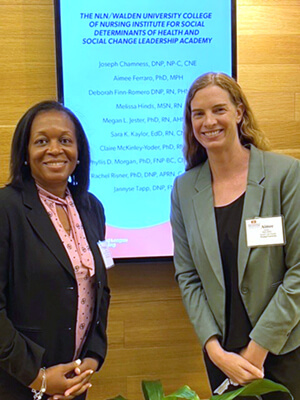Drs. Phyllis Morgan and Aimee Ferraro share how leadership development can improve health equity.

In August, the Institute for Social Determinants of Health and Social Change—a groundbreaking collaboration between the National League for Nursing and Walden’s College of Nursing—named 10 distinguished thought leaders in nursing and health education to its Leadership Academy. Walden faculty members Dr. Aimee Ferraro, an epidemiologist, and Dr. Phyllis Morgan, a certified family nurse practitioner, were among those chosen through a competitive application process.
They connected with Walden Associate President and Provost Dr. Sue Subocz to share what their experience in the Leadership Academy will mean for them, students, and Walden’s mission of social change.
Dr. Sue Subocz: You are both exemplary social change agents and scholar-practitioners. What does it mean to now be part of the Leadership Academy?
Dr. Ferraro: Since we are in the inaugural cohort, we weren’t sure what to expect when we went to orientation. We found that it’s an excellent group of nurses and academics who are highly motivated. I’m not a nurse. I’m an epidemiologist, which is a related discipline. But it was clear that having an interdisciplinary group would strengthen our ability to make a difference collectively.
Dr. Morgan: Meeting our colleagues made me more aware of my duty to build my leadership skills and use them to help address social determinants of health. I’m an advanced practice nurse practitioner, so it’s an opportunity to find ways to better understand social determinants, and to be better prepared to apply this knowledge in the areas of teaching, practice, and research.
Dr. Subocz: I know this is just the beginning, but what do you see as potential outcomes?
Dr. Morgan: I’m already seeing opportunities. I’m a member of the first black nursing sorority, Chi Eta Phi Sorority, Inc. I was talking with some members of the sorority recently about cardiac issues in the black community, and I said we need to consider the social determinants of health. Being part of Walden and the Leadership Academy, I feel like I carry that torch with me.
Dr. Ferraro: It is like we are planting seeds of social determinants of health in different areas. Like we’ve been asked to be the beginning of a ripple effect. As part of the Leadership Academy, we’re tasked with completing an independent project, and as a group, we are also considering a collaborative project in which we develop a handbook for incorporating social determinants of health into interdisciplinary curricula and evaluating how it impacts students and communities.
Dr. Subocz: What would you like to share with students about this experience?
Dr. Ferraro: I had an epiphany at the orientation. They asked if we felt like leaders, and at that moment I didn’t. I felt some imposter syndrome. One of the organizers approached me later and helped me realize that I already am a leader. That’s something I hope I can help students understand, too. Everybody has the opportunity to be a leader in some fashion. You have to find your strengths and capitalize on them, rather than focus on your weaknesses. Instead, network with people who have different strengths so you can build a well-rounded team. Look at social determinants of health around you and start with small steps, such as writing a letter to your member of Congress or posting a blog about an issue you are passionate about.
Dr. Morgan: I agree. Leadership is a quality we all have. It’s our responsibility to mentor our students. Even online, we can show students how to be leaders and demonstrate the importance of the social determinants of health no matter what academic program they pursue. We also need to address our biases. The work you do is going to affect people, and you have to really know yourself to act equitably for positive social change.



